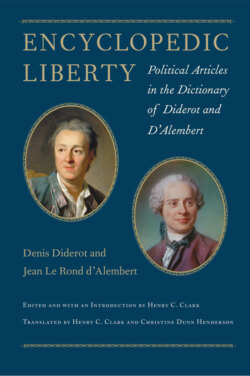Читать книгу Encyclopedic Liberty - Jean Le Rond d'Alembert - Страница 23
На сайте Литреса книга снята с продажи.
Оглавление[print edition page 46]
[print edition page 47]
Masterpiece †
(Chef-d’Œuvre)
For other entries on early manufacturing, see INDUSTRY, INNOVATION, INVENTION, and MASTERSHIPS, below.
*MASTERPIECE (Arts, Crafts), one of the most difficult works in a profession, executed by candidates wishing to join a guild or corporation, after completing a period as an apprentice and journeyman, according to the rules of the guild. Each corporation has its own masterpiece, which is carried out in the presence of doyens, syndics, senior members, and other officers and dignitaries of the corporation. It is presented to the guild’s members, who examine it before it is registered. Some corporations allow the aspiring master craftsman to choose between several different masterpieces, while others ask for more than one. See the rules of these corporations concerning the prevailing norm for the reception of master craftsmen. The masterpiece in architecture is a classic exercise, such as designing a slanting arch, the top and sides of which hold up a cylindrical ceiling; the carpenters’ masterpiece is a curved stair stringer; silk weavers, whether to be received as companions or as masters, must restore a loom to its working order, after the masters and syndics have brought about whatever changes to it they see fit, as, for example, untying the strings or breaking the threads of the
[print edition page 48]
chain at irregular intervals. It is hard to see the utility of the masterpiece. If the candidate can do his job well, then it is a waste of time examining him. If he cannot do his job well, then it should not stop him from joining a corporation, since he will only be harming himself. A reputation as a bad worker will soon force him to give up a job in which he will inevitably face ruin if he finds no work. To be convinced of the truth of these remarks, one needs only know a little of what happens at examinations. Nobody can be a candidate who has not passed through the preliminaries, and it is impossible for anyone not to have learned something of the trade in the four or five years that the preliminaries last. If the candidate is the master’s son, he is generally exempted from doing a masterpiece. Everyone else, even the town’s most skillful workers, will find it hard to produce a masterpiece that is acceptable to the guild, if ever they are disliked by the guild.1 If they are liked, on the other hand, or if they have money, even if they know nothing whatsoever about the job, then they can either bribe the people supervising them during the execution of the masterpiece, carry out a poor piece of work that will be received as a masterpiece or present an excellent piece of work done by someone else. It is clear that such practices do away with any advantages that can be claimed for the masterpiece or for guilds, and yet guilds and corporate bodies for manufacturing continue to exist all the same.
